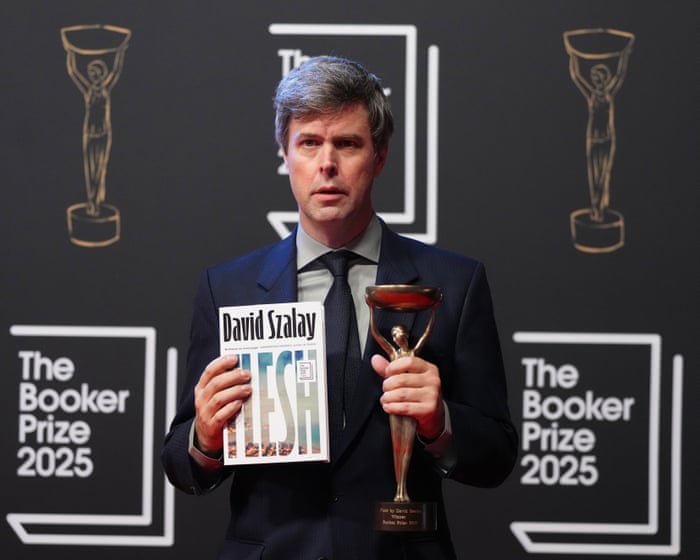When David Szalay’s novel Flesh won the Booker Prize, one detail immediately caught attention: how frequently the main character says “OK.” István uses this response about 500 times, reflecting the book’s sparse prose style. Through this approach, the British-Hungarian author offers little insight into the inner life of a man whose life is marked by dramatic ups and downs.
Despite István’s inarticulate nature, the fact that a story about a working-class man from Eastern Europe won a major literary award in 2025 has sparked a conversation about masculinity in literature.
GQ magazine urged readers not to reduce the book to mere “discourse fodder.” But in a year when the concept of literary masculinity—and its apparent decline—has been widely discussed, the success of Flesh, which follows a quiet, lustful, and sometimes violent man, was bound to fuel debate.
Szalay has described the novel as “risky,” not only because of its style but because István displays toxic male behavior. “There’s no longer that sense that boys will be boys,” Szalay remarked after his win. “So I expect the main character in Flesh to draw quite a bit of disapproval.”
István’s life takes him from a young offender facility after an act of violence, to the army, then to working security at a strip club, and later as a driver and security guard. “These aren’t exclusively male paths,” says Booker judge and novelist Chris Power, “but they are predominantly male or traditionally male.”
This year, some have questioned whether male novelists and male-centered themes are permanently out of style. In April, a new publishing imprint called Conduit Books was launched with the goal of releasing literary fiction and memoirs by men, responding to what its founder Jude Cook described as “a perception that the male voice is problematic.” Cook noted that the publishing industry has shifted in reaction to the “prevailing toxic male-dominated literary scene of the 80s, 90s, and 00s.”
The Booker longlist, which included six men and seven women, along with Szalay’s victory, offered a strong counterpoint to that argument. But Flesh’s win didn’t just challenge a perceived trend in literature—it also tapped directly into ongoing discussions about what it means to be a man in 2025.
Much of the coverage following the prize has framed the novel within the broader “crisis of masculinity,” highlighted by the rise of influencers like Andrew Tate and debates sparked by Netflix’s incel-themed drama Adolescence. “The idea of a crisis of masculinity in the wider culture—with suicide rates or younger kids turning to figures like Andrew Tate—it’s almost colliding with literature,” Power observes.
Critic and author Leo Robson adds, “Maybe it’s easier in an age where there’s been quite a healthy debate about masculinity and male behavior to champion someone like David Szalay, who writes about men in a skeptical, inquiring spirit.”
Looking at other Booker-shortlisted books by men reveals some loose connections. Power points out that novels by male authors on the list shared themes of “infidelity” and men being “led by lust,” both of which are central to Flesh. Ben Markovits’ The Rest of Our Lives deals with a mid-life crisis, Benjamin Wood’s Seascraper follows the everyday life of a shrimp fisherman, and Andrew Miller’s The Land in Winter begins with a young man’s suicide.
But Power sees István primarily as someone grappling with status anxiety and financial instability—struggles familiar to many young people today. “I think István is struggling to gain control of his life,” he says. “That speaks to a kind of universal feeling, something that’s obviously very keenly felt by many.”
Flesh by David Szalay (Vintage Publishing, £18.99). To support the Guardian, order your copy at guardianbookshop.com.Delivery charges may apply.
Frequently Asked Questions
Of course Here is a list of FAQs about the Booker Prizewinning novel Flesh and its debate on masculinity with clear and concise answers
General Beginner Questions
1 What is the book Flesh about
Flesh is a novel that explores the life of its protagonist delving into themes of identity desire and the complex pressures of modern masculinity through its raw and intimate narrative
2 Who is the author of Flesh
The authors name would be inserted here
3 Why did Flesh win the Booker Prize
It won for its powerful and unflinching portrayal of contemporary life its literary excellence and for sparking an important cultural conversation about the state of manhood today
4 What is the main debate the book sparks about masculinity
The book debates whether traditional ideas of masculinity are still relevant exploring the conflict between societal expectations of strength and stoicism and the human need for vulnerability emotional expression and intimacy
Thematic Deeper Questions
5 How does Flesh define masculinity
The novel doesnt offer a single definition Instead it presents masculinity as a complex often contradictory spectrumencompassing fragility violence tenderness and confusionthat its characters struggle to navigate
6 What are some examples from the book that challenge traditional masculinity
Key examples might include male characters openly expressing fear or sadness engaging in nurturing roles or grappling with their physicality and sexuality in ways that defy the strong silent stereotype
7 What is toxic masculinity and how is it addressed in the book
Toxic masculinity refers to cultural norms that associate manhood with dominance aggression and emotional suppression The book addresses this by showing the harmful consequences these expectations have on the characters relationships and mental health
8 Is the book only for male readers
No not at all While its focus is masculinity its themes of identity societal pressure love and belonging are universal making it a compelling read for anyone



